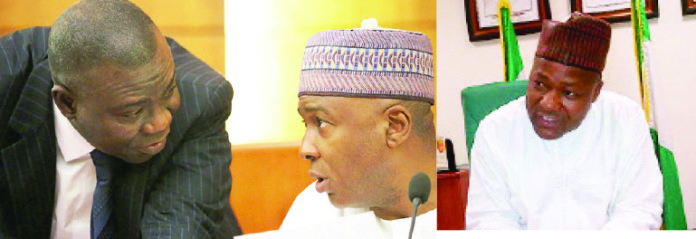Editor, Politics/Features, EMEKA ALEX DURU, takes a look at the National Assembly in the last one year, throwing to the fore its areas of accomplishment and default.
But for relative semblance of stability which prevailed in the Senate and House of Representatives in the last couple of months, the eighth National Assembly (NASS), which clocked one year on Wednesday, June 8, would easily have passed as a complex of controversies.
The controversies, occasioned by human and institutional factors, virtually set the tone for the business of the legislature at its inauguration on June 8, 2015. While the confusion lasted, it exposed the underbelly of the ruling All Progressives Congress (APC), portraying it as a party that was merely concerned with grabbing power and not necessarily what to do with it.
What particularly set the stage for the theatre of the absurd that NASS almost degenerated into was the crisis that trailed the election of its principal officers.
Before the inauguration of both chambers of NASS, APC had, in a manner that was not elaborately explained to even some key members, settled for Ahmed Lawan as Senate President and George Akume as Deputy Senate President. It also positioned Femi Gbajabiamila as House of Representatives Speaker, while Ali Monguno was to be his deputy.
The decision, however, did not go down well with the Bukola Saraki group in the Senate nor the Yakubu Dogara elements in the House of Representatives. The aggrieved elements, who clearly had been schemed out of APC consideration, went into alliance with their PDP colleagues, thus giving rise to Saraki/Ike Ekweremadu victory in the Senate and Dogara’s emergence in the House.
The outcome struck the APC as a thunderbolt. Raising the banner of supremacy of the party, the party promptly vowed to get even with the Saraki and Dogara groups.
In what appeared the first salvo, APC fired a statement by its then National Publicity Secretary, Lai Mohammed (now Minister of Information), where it dismissed the emergence of Saraki and Dogara as totally unacceptable, describing it as the highest level of indiscipline and treachery by the affected officers.
“There can be no higher level of treachery, disloyalty and insincerity within any party,” he fumed, adding that the party would use all constitutional and legal means available to it to reverse the exercise. Mohammed vowed that APC would not accord the current NASS leadership any recognition, adding, curiously, that with the developments in the legislature, the change promised to Nigerians by the party would no longer be attainable.
Even with what seems relative stability in the affairs of the two chambers, Saraki, who went ahead to fill the key offices in the Senate with his loyalists, is yet to get a reprieve from the party’s leadership. The Presidency, which had initially pledged neutrality in the affairs of the legislature, somehow, got drawn into the impasse by the utterances and body language of President Muhammadu Buhari, in which he barely disguised his utter disdain for the Senate leadership. Reports insinuated that Mr. President, on several occasions, avoided scheduled meetings with Saraki.
Enter CCT saga
It was against that backdrop that when the Senate President got involved in asset declaration saga with the Code of Conduct Tribunal (CCT), many readily read the unseen hands of the presidency and APC on the matter.
Saraki’s ordeal with CCT began to take shape on September 11, 2015, when he was charged to the tribunal by the Code of Conduct Bureau (CCB) over allegations of false declaration of his assets, contrary to constitutional requirements.
Part of the accusation was that he deliberately manipulated the assets declaration form he filed prior to his assumption of office as the Senate President, by making anticipatory declaration of assets.
He was equally accused of failing to declare some assets he acquired while in office as governor, from 2003 to 2011.
Saraki was also expected to explain before the CCT how he acquired some assets which the federal government believed were beyond his legitimate earnings.
While trial asted, the Senate was divided along two broad lines of those supporting Saraki and those angling for his fall. Some even made outright calls for his resignation, stressing that his presence in the dock put the integrity of the legislature to question. The trial and consequent division gravely affected the workings of the upper legislative chamber.
Saraki acknowledged same in his recent encounter with journalists, describing it as a distraction.
“We could have done more. There are a lot of hours that we are losing when we go to court. We have to do that; I want to clear my name as soon as possible, so that we can move forward. It is an unfortunate distraction. I think it was ill-conceived by those that started it,” he said.
Lagos State APC Publicity Secretary, Joe Igbokwe, however sees the Senate President’s travail as a befitting reward for perfidy, vowing that he would go down at the end of the day.
According to him, “APC does not want Bukola Saraki as the Senate President. Saraki has caused enough implosions within the party. He has brought public opprobrium to the party. He has slowed down the party’s machinery from taking off smoothly. He has portrayed us as a weak party. Now is the time for him to go. Saraki has no choice than to go, otherwise he will have himself to blame.”
The Senate President has not gone. He is even not thinking of doing so. If anything, he is looking at post-CCT Senate where he and his colleagues would come up with legislative initiative that should guard against carrying lost political battles to the legal arena.
The current Senate, Saraki stressed, remains focused, adding that at the end of its term, the members would have made a lot of great strides that would set the chamber and NASS at a level much higher than they met it.
He identified setting up a constitution amendment committee headed by the Deputy Senate President to streamline areas of the constitution needed to be amended as a bold effort by his colleagues.
The House of Representatives, which also had its own share of restiveness earlier, seems to have got its acts right, after all. In the scorecard of the Green Chamber released last week, Turaki Hassan, media aide to the Speaker, enthused that the legislators set standard in the number of bills and motions they had seen through.
He said: “It should be noted that in the seventh Assembly, which was rated high in terms of bill’s passage, 700 bills were presented in four years, while in just one session, about 600 bills of high quality were presented in this assembly for consideration, most of which were from the recommendation of the Statutes Reform committee constituted by the Speaker.”
According to him, almost 80 of those bills, representing about 18 per cent of the 600, have been effectively passed by the House.
In similar stead, Hassan stated that the House, by last month, had considered 600 motions, which he said was an unprecedented effort.
Notwithstanding, Nigerians insist that members of NASS need to do more. Dr. (Mrs.) Ijeoma Ogbuehi, Director, Gender Care Initiative, a Lagos-based Non-Governmental Organisation (NGO), argued that the legislators need to rise beyond controversies and perks of office and devote more time in their core constitutional duties.
“What we read on cars being purchased for the lawmakers at exorbitant rates was disgusting. The stories that trailed the budget controversies were not what we bargained for. I think the lawmakers need to rise beyond these. They are trying in some areas, no doubt. But I think they still need to put in more efforts,” she remarked.
Many Nigerians reason in that respect.













